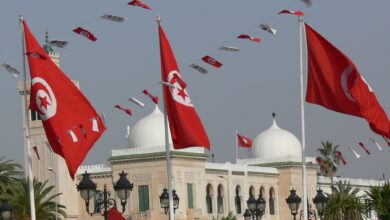The head of Tunisia's ruling Islamist party, Rachid Ghannouchi, said on Tuesday that the Arab Spring provided an opportunity to reconcile Arab public opinion with the West.
He spoke at the opening of a conference in Doha on relations between the United States and the Muslim world focused on the challenges created by the popular revolts that have swept the region and changed the political map.
Since they first began in Tunis at the end of 2010, popular uprisings have forced from power the leaders of Tunisia, Egypt, Libya and Yemen.
"It is the start of a process to rectify the flawed historical situation that saw Western countries supporting dictators in the region, whose people hated those countries for their support," Ghannouchi was quoted as saying by Qatar's state news agency QNA.
The West's "positive" response to the political changes in the region, marked by the emergence of Islamist trends, "is in its interest as it is in the interests of the people of the region," said the head of Ennahda, which came to power in Tunisia after president Zine al-Abidine Ben Ali’s ouster in January 2011.
"We don't want relations based on suspect arrangements, but on common interests," he said, adding that "the Arab policies of the West were wrong because they only defended Western interests, in cooperation with the tyrannical regimes."
Nihad Awad, a director and co-founder of the Council on American-Islamic Relations, said "the new situation in the Middle East … offers the chance to establish positive relations between the United States and Islamic world."
Awad said the "the new situation is a real test for both parties.
The Islamists must opt for "democracy … the rule of law and the rotation of power," and the West should "support the new experiences to help them succeed," he argued.




